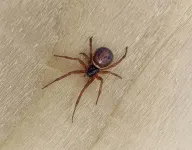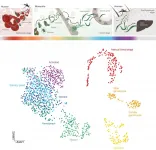INFORMATION:
The full study in Clinical Toxicology is available at https://doi.org/10.1080/15563650.2021.1928165. END
New study confirms noble false widow spiders bites can result in hospitalization
NUI Galway study confirms that the Noble False Widow spider does have public health implications
2021-05-27
(Press-News.org) NUI Galway study confirms that the Noble False Widow spider does have public health implications
Research team have established a DNA database to allow clinicians dealing with cases to confirm the species identity using genetic analysis
Epidemiology of bites reveals that almost all bites occurred in and around the home, and 88% of bites occurred when the victim was either asleep in bed or when the spider was trapped in clothing
In parts of Ireland and Britain, the False Widow spider has become one of the most common species of spiders found in and around urban habitats
A team of scientists from NUI Galway have published a new study showing that Noble False Widow spiders can deliver a bite that requires hospitalisation.
The threat posed by the Noble False Widow spider has been debated among spider and healthcare specialists for many years. This new study, published in the international medical journal Clinical Toxicology, confirms that some bite victims experience symptoms very similar to the true black widow spiders and some severe cases require hospitalisation.
Originating from Madeira and the Canary Islands, the Noble False Widow spider Steatoda nobilis, now has the potential to become one of the world's most invasive species of spider. It was first documented in Britain over 140 years ago, but in recent decades the species has suddenly increased in numbers, significantly expanding its range and density.
The reasons behind this sudden expansion are not clear. Scientists have ruled out climate change as the likely cause but have suggested that a new genetic mutation within the species may have made Noble False Widows more adaptable to new environments. In addition, the species has benefited from an ever-increasing globalised economy, hitchhiking in containers and crates throughout the globe. Human movement has largely contributed to spread this species throughout Europe, North Africa, West Asia and parts of North and South America.
In parts of Ireland and Britain, it has become one of the most common species of spiders found in and around urban habitats. With the increase in False Widow spiders around homes, bites are becoming more prevalent, and scientists are now beginning to realise the full medical importance of these spiders.
Envenomation symptoms can be both localised and systemic, ranging from mild to debilitating pain and mild to intense swelling. Some victims have experienced tremors, reduced or elevated blood pressure, nausea and impaired mobility. In rare instances, victims have developed minor wounds at the bite site or had to be treated for severe bacterial infections.
The research team at NUI Galway have established a DNA database to allow clinicians dealing with cases to confirm the species identity using genetic analysis. This is especially important when the spider has been squashed so an accurate identification of the spider can be made. The study also provides epidemiology of bites which reveals that almost all bites occurred in and around the home, and 88% of bites occurred when the victim was either asleep in bed or when the spider was trapped in clothing. The team are encouraging members of the public to email them at falsewidow@nuigalway.ie if they think they may have been bitten.
Dr Michel Dugon, Head of the Venom Systems Lab at NUI Galway and senior author of the study, said: "In addition to their medically significant venom, Noble False Widows are extremely adaptable and competitive in the wild. Two decades ago, this species was almost unknown in Ireland, the UK or in continental Europe. We still have much to learn about its genetics, origin, behaviour and development. One thing is certain though: this species is here to stay, and we must learn how to live with it."
Dr John Dunbar, Postdoctoral Researcher at the Venom Systems Lab at NUI Galway and lead author of the study, said: "Speculations around the potential severity of the bites by the Noble False Widow have been debated for many years. We only compiled envenomation cases where we had a clear identification of the spider responsible for the bite. We had to rely on DNA extraction and genetic profiling to confirm some cases. We are encouraging people to capture a photograph of the spider immediately after being bitten. Our latest study confirms without a doubt that Noble False Widows can cause severe envenomations (the process by which venom is injected).
"This species is increasing its range and population density which will undoubtedly lead to an increase in bites (since submitting our study in March we have already received further confirmed bite cases). While most cases will have a mild outcome, we need to continue to closely monitor bites by the Noble False Widow to understand the potential range of symptoms and to treat severe cases when they occur."
Aiste Vitkauskaite, MSc student in Toxicology at NUI Galway and joint lead in the study, said: "Approximately ten species of Irish spiders have fangs large enough to bite through human skin, yet over the past five years, we have never heard of anybody being bitten by any of the native species. Within the same period, we have recorded dozens of confirmed or probable False Widow bites. These spiders will become increasingly common and so will their bites."
Professor Derek O'Keeffe, Professor of Medical Device Technology at NUI Galway and Consultant Physician, University Hospital Galway said: "This innovative research led by Dr Dugon and his team clearly demonstrates that Noble False Widow spider bites may result in significant patient morbidity that requires hospital care. This is important as previously we only had anecdotal evidence of its potential harms in victims and therefore this new evidence will allow the updating of clinical guidelines and protocols. These findings demonstrates the key importance of interdisciplinary collaboration between scientists and clinicians to improve patient care."
ELSE PRESS RELEASES FROM THIS DATE:
Socioeconomically disadvantaged adolescents' diets worsened during lockdown
2021-05-27
Eating habits amongst the young changed during the lockdown imposed due to COVID-19 and worsened in the case of those belonging to socioeconomically disadvantaged groups. These are the chief findings of an open access study published in specialist journal Nutrients, headed by researchers Alícia Aguilar Martínez, of the Universitat Oberta de Catalunya, and Marina Bosque Prous, of the UOC and UManresa, as part of the DESKcohort project of the interuniversity Epidemiology and Public Health research group GRESP.
The study, of 303 Catalan young people aged between 12 and 18, sought to establish how this age group's diet had changed from March to May 2020, in terms of both eating behaviours and the products consumed. The goal was to collect data to ascertain ...
Mathematical model developed to prevent botulism
2021-05-27
For years, food producers who make lightly preserved, ready-to-eat food have had to follow a set of guidelines to stop growth of Clostridium botulinum bacteria and production of a strong neurotoxin. The toxin can cause a serious illness called botulism.
For refrigerated products, the guidelines for controlling Clostridium botulinum indicate that the water contained in the products should have a salt content of at least 3.5%. Unfortunately, this hampers efforts to develop salt-reduced products, even though such products would benefit public health, as most consumers eat more salt than recommended.
If food producers want to launch products that contain e.g. less salt, they have had to conduct laboratory experiments to document ...
Artificial neurons recognize biosignals in real time
2021-05-27
Current neural network algorithms produce impressive results that help solve an incredible number of problems. However, the electronic devices used to run these algorithms still require too much processing power. These artificial intelligence (AI) systems simply cannot compete with an actual brain when it comes to processing sensory information or interactions with the environment in real time.
Neuromorphic chip detects high-frequency oscillations
Neuromorphic engineering is a promising new approach that bridges the gap between artificial and natural intelligence. An interdisciplinary research team at the University of Zurich, the ETH Zurich, and the ...
Soft drink ads target 'vulnerable'
2021-05-27
What keeps consumers hooked on high sugar soft drink? Advertising, of course. But why are some consumers more adept at ignoring these cues than others?
A new study from Flinders University, published in Appetite, found participants with an automatic bias towards soft drinks - or difficulty resisting sweet drinks compared to non-sweetened control beverages (e.g., water) - were more responsive to the ads than those without these tendencies.
The Australian study compared the ability of 127 university-age students (18-25 year olds) to withstand or succumb to the urge to reach for a soft drink when viewing television advertisements.
"Perhaps, then, we can start targeting people who show these ...
Autism Spectrum Disorder - National database reveals a cumulative incidence of 2.75%
2021-05-27
Analysis using a national medical database revealed that the cumulative incidence of autism spectrum disorders (ASD) in children born in 2009-2014 was 2.75% by the age of five. A research group led by Associate Professor Daimei Sasayama and Professor Hideo Honda of the Department of Child and Adolescent Development Psychiatry, Shinshu University School of Medicine, used a national medical database to analyze autism spectrum disorders in Japan. It was reported that the cumulative incidence showed an increasing trend for each year of birth, and that there were regional differences.
This cumulative incidence of ASD is the highest in the world based on medical diagnosis, suggesting high diagnostic ...
Poor sleep predicts long-term cognitive decline in Hispanics more so than in whites
2021-05-27
Poor sleep impacts the risk of long-term cognitive decline in Hispanic/Latino middle aged and older adults differently than it does in non-Hispanic adults, according to research led by University of Miami Miller School of Medicine neurology faculty and the largest long-term study of U.S. Hispanic/Latinos to date.
During seven years of follow-up, Hispanics/Latinos were more likely to develop cognitive declines in processing speed, mental flexibility, and verbal memory, if they had sleep disordered breathing, such as obstructive sleep apnea, and long sleep duration of nine or more hours. The risk was especially high in middle-aged adults without metabolic syndrome and women without obesity or metabolic syndrome ...
Effects of nanoplastics on Canadian and Guadeloupean oysters
2021-05-27
Oysters' exposure to plastics is concerning, particularly because these materials can accumulate and release metals which are then absorbed by the molluscs. According to a recent study published in the journal Chemosphere, the combined presence of nanoplastics and arsenic affects the biological functions of oysters. This study was conducted by the Institut national de la recherche scientifique (INRS) in Québec City and the French National Centre for Scientific Research (CNRS) at the University of Bordeaux in France.
The international research team chose to study arsenic, since it is one of the most common metals absorbed ...
Plastic waste has some economic benefit for developing countries
2021-05-27
PULLMAN, Wash. - For decades, wealthy nations have transported plastic trash, and the environmental problems that go with it, to poorer countries, but researchers have found a potential bright side to this seemingly unequal trade: plastic waste may provide an economic boon for the lower-income countries.
In a study published in the Journal of World Systems Research, Yikang Bai of Washington State University and Jennifer Givens of Utah State University analyzed 11 years of data on the global plastics trade against economic measures for 85 countries. They found that the import of plastic waste was associated with growth in gross domestic product per capita in the lower-income countries.
"Our study offers a nuanced understanding of the global trade in plastic waste," said Bai, ...
Obsessive compulsive disorder linked to increased ischemic stroke risk later in life
2021-05-27
DALLAS, May 27, 2021 -- Adults who have obsessive-compulsive disorder (OCD) were more than three times as likely to have an ischemic stroke later in life compared to adults who do not have OCD, according to new research published today in Stroke, a journal of the American Stroke Association, a division of the American Heart Association.
"The results of our study should encourage people with OCD to maintain a healthy lifestyle, such as quitting or not smoking, getting regular physical activity and managing a healthy weight to avoid stroke-related risk factors," said study senior author Ya-Mei Bai, M.D., Ph.D., a professor in the department of psychiatry at Taipei Veterans General Hospital ...
Atlas of malaria parasite gene activity provides new targets for drugs and vaccines
2021-05-27
Researchers have mapped in fine detail the genetic changes malaria parasites go through as they prepare to infect people.
The atlas maps the malaria parasite Plasmodium falciparum in unprecedented cellular detail as it develops inside a mosquito and prepares to infect humans through a bite. This detailed investigation could lead to new ways to block key stages in the parasite's development and prevent transmission through future drugs or vaccines.
Mosquitoes are increasingly resistant to pesticides, and the parasite that causes malaria is also becoming increasingly ...
LAST 30 PRESS RELEASES:
New research finds heart health benefits in combining mango and avocado daily
New research finds peanut butter consumption builds muscle power in older adults
Study identifies aging-associated mitochondrial circular RNAs
The brain’s primitive ‘fear center’ is actually a sophisticated mediator
Brain Healthy Campus Collaborative announces winner of first-ever Brain Health Prize
Tokyo Bay’s night lights reveal hidden boundaries between species
As worms and jellyfish wriggle, new AI tools track their neurons
ATG14 identified as a central guardian against liver injury and fibrosis
Research identifies blind spots in AI medical triage
$9M for exploring the fundamental limits of entangled quantum sensor networks
Study shows marine plastic pollution alters octopus predator-prey encounters
Night lights can structure ecosystems
A parasitic origin for the ribosome?
A gold-standard survey of the American mood
Tool for identifying children at risk of speech disorders
How Japanese medical trainees view artificial intelligence in medicine
MambaAlign fusion framework for detecting defects missed by inspection systems
Children born with upper limb difference show the incredible adaptability of the young brain
How bacteria can reclaim lost energy, nutrients, and clean water from wastewater
Fast-paced lives demand faster vision: ecology shapes how “quickly” animals see time
Global warming and heat stress risk close in on the Tour de France
New technology reveals hidden DNA scaffolding built before life ‘switches on’
New study reveals early healthy eating shapes lifelong brain health
Trashing cancer’s ‘undruggable’ proteins
Industrial research labs were invented in Europe but made the U.S. a tech superpower
Enzymes work as Maxwell's demon by using memory stored as motion
Methane’s missing emissions: The underestimated impact of small sources
Beating cancer by eating cancer
How sleep disruption impairs social memory: Oxytocin circuits reveal mechanisms and therapeutic opportunities
Natural compound from pomegranate leaves disrupts disease-causing amyloid
[Press-News.org] New study confirms noble false widow spiders bites can result in hospitalizationNUI Galway study confirms that the Noble False Widow spider does have public health implications


